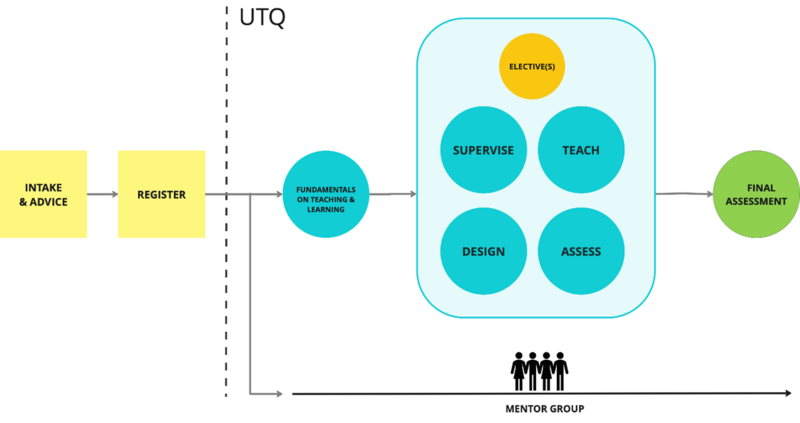University Teaching Qualification
The University Teaching Qualification (UTQ), or Basiskwalificatie Onderwijs (BKO) in Dutch, serves as proof of the didactic competence of lecturers in academic education. The UTQ is recognised by all 14 Dutch universities. By following a UTQ track, you develop your didactic skills in five competency domains: designing, teaching and supervising, assessment, evaluating, and professionalisation. The UTQ is the starting point of your ongoing development as a teacher. The programme is designed around typical questions new teachers are confronted with, such as “How do I structure my lecture?”, "How can I make my lessons interesting?", "How do I keep my students motivated?", "How do I assess if my Learning Objectives have been achieved?", and "How do I prevent problems concerning students not pulling their weight?".
-
The core of the UTQ is the development and demonstration of 5 didactic competences in a personal UTQ dossier.
Competence 1: designing or redesigning education
- Explain how their course is embedded in the curriculum or degree programme as a whole.
- Design teaching based on the principles of ‘constructive alignment’.
- Design active, effective, and efficient learning methods and learning materials.
- Design their teaching with respect to the specific (curricular) characteristics and needs of the students.
- Design their teaching in a practically and logistically feasible (do-able) way.
Competence 2: teaching and supervising
- Prepare an educational meeting.
- Conduct an educational meeting and reflect on their performance.
- Supervise students, individually and in groups.
Competence 3: Assessment
- Design and implement the assessment of student development and learning outcomes.
- Analyse the assessment results and draw conclusions.
Competence 4: evaluating teaching
- Conduct an evaluation and collect information (data) purposefully to improve their teaching.
- Analyse evaluation results, draw conclusions, and pinpoint areas for improvement.
Competence 5: Professionalization
- Formulate their own vision on teaching and student learning.
- Manage their work as a teacher and can collaborate in a teaching team.
- Reflect on their work as a teacher and on their future professional development in teaching.
UTQ Trajectory
"Based on your submitted intake form and intake meeting, we will determine how the programme can fit your personal situation best. You always start with completing the first stepping stone: the Fundamentals module and you join a mentor group, followed by the modules, (two electives and four compulsory modules) and complete with a Final Assesment."
If you have started your UTQ before 1 March 2025, you can still complete your UTQ in the old programme. If you have questions, you can contact your mentor. If you don’t have a UTQ mentor, you can contact bko@tudelft.nl.
The TU Delft UTQ programme has a modular set up. For each of the core modules you complete, you receive a partial certificate for one of the 4TU UTQ competences. These certificates can be obtained independently and in any order. The UTQ assignments are focused on your own teaching practice. The competence Professionalisation is continuous, and it concerns your development in all competency domains. This runs like a red thread through the programme and is covered in the mentor groups. After completing all four partial certificates and electives, you complete your UTQ with the Final Assessment meeting focusing on the competence Professionalisation.
Practical information
| Target group | All newly appointed staff with UFO profile HGL, UHD, UD, or Teacher who, at the time of appointment:
|
| Study load | 160 hours |
| Duration | On average 1,5 years, you need to complete the UTQ within 4 years (according to TUD HR policy) from your date of appointment. |
| Course fee | EUR 3000 |
| Language | The programme is taught in English, unless the entire course group consists of Dutch speakers. |
| UTQ Partial certificates | If you already possess a UTQ partial certificate on the competence Teaching and/or Supervising from another university in the Netherlands, you do not need to join the UTQ TEACH/SUPERVISE module and write the Proof of Competence that is related to the partial certificate. |
Overview of necessary educational tasks
To be able to work on the competencies within the UTQ trajectory, it is important that you have sufficient teaching experience and tasks during the time that you participate in the UTQ. In the table below you can read which these are:
| Competence/partial certificate | Required (current) teaching tasks |
| Teaching | > 0,2 FTE teaching practice (lectures, tutorials, or other forms of education). |
| Supervising | Supervising a student in a thesis or internship (BSc,MSc or PhD level). |
| (Re)designing and evaluating teaching | Involvement in an already running course in which you (re-)design (a large part of) the course. |
| Assessment | Involvement in a course in which you (re-)design (a large part of) the assessment and access to assessment data. |
If you do not have appropriate tasks, consult your supervisor.
Guidance and assessment
You will be coached by the trainers of the modules. During the modules and in the mentor group you will collaborate with lecturers from other faculties. You will receive feedback from the trainers and your peers on the various assignments. The trainers of the modules will issue the partial certificates for the modules. The Final Assessment will be done by a committee.
Apply for the UTQ programme
- Make sure you have the approval of your manager before you register for the UTQ programme.
- Fill out the intake form. Based on your intake form you will receive an advice or invitation to a personal intake meeting within three weeks.
- After receiving advice, choose a date for the Fundamentals module. Register for the Fundamentals module and a mentor group via the Opleidingsportaal.
- Register for the modules and electives (in your own preferred order) via the Opleidingsportaal.
